Unit 8 语法
Unit 8 When is your birthday课文及语法重点
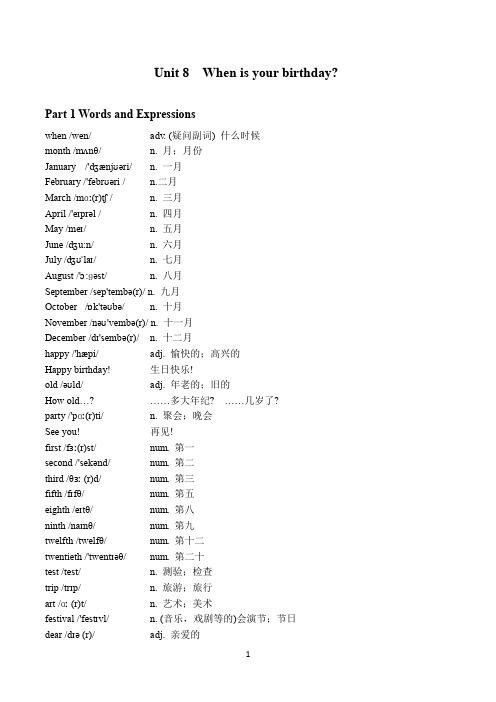
Unit 8 When is your birthday?Part 1 Words and Expressionswhen /wen/ adv. (疑问副词) 什么时候month /mʌnθ/ n. 月;月份January /'dʒænjʊəri/ n. 一月February /'febrʊəri / n.二月March /mɑː(r)tʃ / n. 三月April /'eɪprəl / n. 四月May /meɪ/ n. 五月June /dʒu:n/ n. 六月July /dʒʊˈlaɪ/ n. 七月August /'ɔ:ɡəst/ n. 八月September /sep'tembə(r)/ n. 九月October /ɒk'təʊbə/ n.十月November /nəʊ'vembə(r)/ n. 十一月December /dɪ'sembə(r)/ n. 十二月happy /'hæpi/ adj. 愉快的;高兴的Happy birthday! 生日快乐!old /əʊld/ adj. 年老的;旧的How old…?……多大年纪? ……几岁了?party /'pɑː(r)ti/ n. 聚会;晚会See you! 再见!first /fɜː(r)st/ num.第一second /'sekənd/ num.第二third /θɜː (r)d/ num.第三fifth /fɪfθ/ num.第五eighth /eɪtθ/ num.第八ninth /naɪnθ/ num.第九twelfth /twelfθ/ num.第十二twentieth /'twentɪəθ/ num.第二十test /test/ n. 测验;检查trip /trɪp/ n. 旅游;旅行art /ɑː (r)t/ n. 艺术;美术festival /'festɪvl/ n. (音乐,戏剧等的)会演节;节日dear /dɪə (r)/ adj. 亲爱的student /'stjuːdnt/ n. 学生thing/θɪŋ/n. 东西;事情term /tɜː (r)m/ n. 学期busy /'bɪzi/ adj. 忙碌的;无暇的time /taɪm/ n. 时间Have a good time! (表示祝愿) 过得愉快!there /ðeə (r)/ adv. (在)那里How old ……多大年纪?……几岁了?e.g. —How old are you?—I’m twelve years old. / I’m ___________.询问其他人的年龄时,句型为How old + ________ + 某人?e.g. How old _______ your brother?festival n. (音乐,戏剧等的)会演节;节日e.g. art festival music festivalthe Spring Festival Dragon Boat Festival春节端午节busy adj. 忙碌的;无暇的1. be busye.g. I am busy. Are you busy?2. be busy doing(v-ing) 忙着做某事e.g I am busy playing baseball.翻译:我弟弟在忙着玩他的飞机模型。
牛津译林版八年级上册英语Unit 8 语法讲解和练习-(含答案)
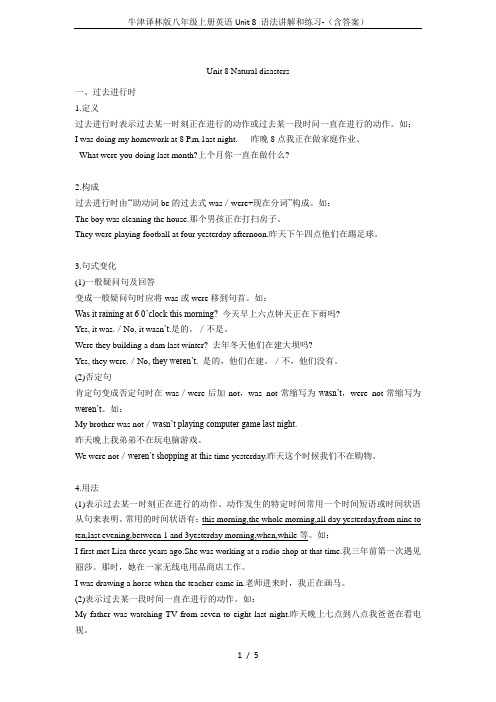
Unit 8 Natural disasters一、过去进行时1.定义过去进行时表示过去某一时刻正在进行的动作或过去某一段时问一直在进行的动作。
如:I was doing my homework at 8 P.m.1ast night. 昨晚8点我正在做家庭作业。
What were you doing last month?上个月你一直在做什么?2.构成过去进行时由‘‘助动词be的过去式was/were+现在分词”构成。
如:The boy was cleaning the house.那个男孩正在打扫房子。
They were playing football at four yesterday afternoon.昨天下午四点他们在踢足球。
3.句式变化(1)一般疑问句及回答变成一般疑问句时应将was或were移到句首。
如:Was it raining at 6 0’clock this morning? 今天早上六点钟天正在下雨吗?Yes, it was./No, it wasn’t.是的。
/不是。
Were they building a dam last winter? 去年冬天他们在建大坝吗?Yes, they were./No, they weren’t. 是的,他们在建。
/不,他们没有。
(2)否定句肯定句变成否定句时在was/were后加not,was not常缩写为wasn’t,were not常缩写为weren’t。
如:My brother was not/wasn’t playing computer game last night.昨天晚上我弟弟不在玩电脑游戏。
We were not/weren’t shopping at th is time yesterday.昨天这个时候我们不在购物。
4.用法(1)表示过去某一时刻正在进行的动作。
动作发生的特定时间常用一个时间短语或时间状语从句来表明。
人教版初一上册英语第八单元unit 8语法篇

Unit8语法篇序数词单项选择1. ---When is your birthday ?---It is January 23rd .A. onB. inC. atD. of2. ---May is the month of a year .A. fiveB. threeC. thirdD. fifth3. David Beckham has children . Brooklyn is his son.A. third ; firstB. three ; oneC. three ; firstD. third ; one4. Today is the boy's birthday . He is 12 years old .A. twelveB. twelvethC. twelfthD. the twelfth5. This is my day in the middle school .A. oneB. the firstC. the oneD. first6. A year has months , and December is month .A. twelve ; twelfthB. the twelve ; twelfthC. twelve ; the twelfth7. ---When is National Day in China ?---It's on .A. May 1stB. July 1stC. October 1st一、基数词变序数词1. two _______2. six_______3. eight _____4. nine______5.thirteen_______6. seventeen________7. twenty-two ________ 8. thirty_____ 9. thirty-one_______二、单词拼写(单句首字母填空)1. As we all know Thursday is the f day of a week.2. Father's Day is on the t Sunday in June.3. Tree Planting Day comes on the t of March.4. Our country developed quickly in the late t century.5. Write your name f , then you come in.三、翻译1. 第六十四中学_________________2. 三分之一____________________3 五分之四_____________________4. 第501房间__________________5. 第二层______________________6. 第三次______________________7. 他每天早上总是第一个到校。
人教版八下英语u8笔记

人教版八下英语u8笔记
以下是有关人教版八下英语u8的笔记,供您参考:
Unit 8 grammar
一、被动语态的构成:
被动语态由助动词be和及物动词的过去分词构成,其基本结构为“be+及物动词的过去分词”。
使用被动语态时需要根据时态和人称进行变化。
二、被动语态的时态:
被动语态有多种时态,包括一般现在时、一般过去时、一般将来时、现在进行时、过去进行时、现在完成时、过去完成时等。
具体形式如下:
1. 一般现在时:am/is/are+过去分词
2. 一般过去时:was/were+过去分词
3. 一般将来时:will be+过去分词
4. 现在进行时:am/is/are being+过去分词
5. 过去进行时:was/were being+过去分词
6. 现在完成时:have/has been+过去分词
7. 过去完成时:had been+过去分词
三、被动语态的用法:
被动语态常用于以下情况:
1. 不知道或不想指出动作的执行者。
2. 强调动作的承受者。
3. 在科技文献和新闻报道中,为了强调客观事实。
4. 在一些习惯用法中,如“It is said that…”(据说……)和“He will be invited to the party.”(他将受邀参加聚会。
)等。
四、主动语态与被动语态的转换:
将主动语态转换为被动语态的方法是将宾语变成主语,将谓语变成被动结构(be+过去分词),将原主语放在by后面,作为被动句中的宾语。
如果原主语不出现,被动句中常常以it作为形式主语。
Unit8_How_do_you_make_a_banana_milk_shake知识点、语法点
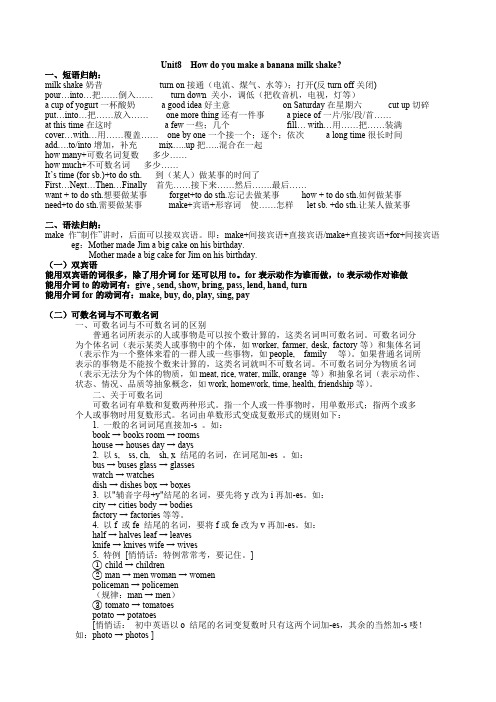
Unit8 How do you make a banana milk shake?一、短语归纳:milk shake奶昔turn on接通(电流、煤气、水等);打开(反turn off关闭) pour…into…把……倒入…… turn down 关小,调低(把收音机,电视,灯等)a cup of yogurt一杯酸奶 a good idea好主意on Saturday在星期六cut up切碎put…into…把……放入…… one more thing还有一件事 a piece of一片/张/段/首……at this time在这时 a few一些;几个fill… with…用……把……装满cover…with…用……覆盖…… one by one一个接一个;逐个;依次 a long time很长时间add….to/into增加,补充mix…..up把…..混合在一起how many+可数名词复数多少……how much+不可数名词多少……It’s time (for sb.)+to do sth. 到(某人)做某事的时间了First…Next…Then…Finally 首先……接下来……然后…….最后……want + to do sth.想要做某事forget+to do sth.忘记去做某事how + to do sth.如何做某事need+to do sth.需要做某事make+宾语+形容词使……怎样let sb. +do sth.让某人做某事二、语法归纳:make 作“制作”讲时,后面可以接双宾语。
即:make+间接宾语+直接宾语/make+直接宾语+for+间接宾语eg:Mother made Jim a big cake on his birthday.Mother made a big cake for Jim on his birthday.(一)双宾语能用双宾语的词很多,除了用介词for还可以用to。
人教版初一(下)英语第16讲:unit 8 语法篇 (学生版)

Unit 8 语法篇____________________________________________________________________________________________________________________________________________________________________熟练掌握本章重点语法知识。
There be 句型:1.there be 句型表示某事存在某人和某物,have、has表示拥有或是某物的一部分如:There are forty students in the classroom.I have a younger sister.2. there be 句型的一般疑问句时把be动词提前,否定句在be动词后面加not,肯定回答和否定回答是要一致。
3. there be 句型中be动词的变化是依据和它最靠近的那个名词而选择is或are,即存在就近原则。
4.there be句型中,some用于肯定句,any用于否定和疑问句,但当表示征询意见或建议时用some 而不能用any1. There is a bookstore across from the school. (改为否定句)a bookstore across from the school.2. There are some flowers on the tree. (改为一般疑问句)flowers on the tree?3. Is there a baseball under the chair? (作出肯定回答)Yes, .4. Are there any trees around your house? (作出否定回答)No, .5.我们班有60个学生.60 students in our class.基础演练一、单项选择1. --- What's in the box? It's so heavy.--- There lots of books in it.A.isB.areC.haveD.be2. There an apple and ten bananas in the basket. You can take any of them.A.areB.isC.hasD.have3. --- a small shop near your home?--- Yes,there is.A.Is itB.Is thereC.Is thatD.Is this4. --- Excuse me,is the nearest bookshop?--- Go down the street.A.howB.whatC.whereD.who5. --- Why are you standing,Alice?--- I can't see the blackboard clearly. Two tall boys are sitting me.A.behindB.next toC.betweenD.in front of巩固提高二、按要求转换句型6. There are some offices in the school building. (改为一般疑问句)offices in the school building?7. There are some trees in front of my classroom. (改为否定句)trees in front of my classroom.8. There is only one computer in the room. (对划线部分提问)there in the room?9. The basketballs are under the bed. (对划线部分提问)the basketballs?10. In front of the bank is the library,and behind the bank is the post office. (改为同义句)The bank is the library the post office.三、翻译(根据中文提示完成句子)11. 在他的课桌上有一台电脑。
鲁教版(五四学制)七年级下册英语Unit 8 语法知识清单
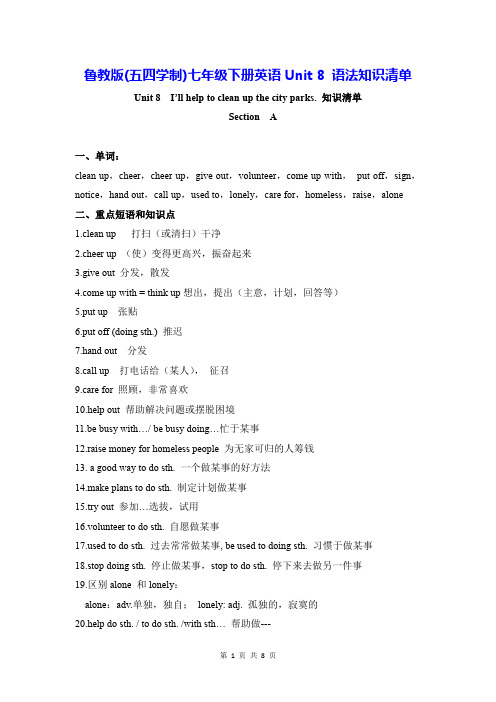
鲁教版(五四学制)七年级下册英语Unit 8 语法知识清单Unit 8 I’ll help to clean up the city parks. 知识清单Section A一、单词:clean up,cheer,cheer up,give out,volunteer,come up with,put off,sign,notice,hand out,call up,used to,lonely,care for,homeless,raise,alone二、重点短语和知识点1.clean up 打扫(或清扫)干净2.cheer up (使)变得更高兴,振奋起来3.give out 分发,散发e up with = think up想出,提出(主意,计划,回答等)5.put up 张贴6.put off (doing sth.) 推迟7.hand out 分发8.call up 打电话给(某人),征召9.care for 照顾,非常喜欢10.help out 帮助解决问题或摆脱困境11.be busy with…/ be busy doing…忙于某事12.raise money for homeless people 为无家可归的人筹钱13. a good way to do sth. 一个做某事的好方法14.make plans to do sth. 制定计划做某事15.try out 参加…选拔,试用16.volunteer to do sth. 自愿做某事ed to do sth. 过去常常做某事, be used to doing sth. 习惯于做某事18.stop doing sth. 停止做某事,stop to do sth. 停下来去做另一件事19.区别alone 和lonely:alone:adv.单独,独自;lonely: adj. 孤独的,寂寞的20.help do sth. / to do sth. /with sth… 帮助做---三、句子1. 你可以帮助清扫城市公园。
Unit8全面知识点总结(词汇、短语、句型、语法、习作) 2020-2021学年人教版八年级英语下册

Unit8知识点全面总结(词汇到作文)2020-2021学年人教版八年级英语下册(词汇、短语、句型、语法、习作)一.课本词汇和用法1.full of 满是...的,大量...be full of 意为“充满/装满……”。
Oliver Twist is about a boy who goes2.out to sea(1)and finds an island full of treasures.Be full of 表示状态,意为“充满...的”full是形容词。
该(2)短语相(3)当于be filled with,意为“以...填充”,是一个被动语态,fill是动词。
例如:I always believe the world is full of love.= I always believe the world is filled with love. 我总是相信世界充满了爱。
full还有“饱的。
饱满的”,其反义词为hungry 饥饿的3.treasure [ˈtreʒər] n. 财富(不可数名词);珠宝,珍藏品(可数名词)例如:They went there to look for treasure. 他们去那里寻宝。
That island is full of treasures. 那座岛上都是珠宝。
4.Island [ˈaɪlənd] n. 岛,岛屿An island 一座岛5.Classic [ˈklæsɪk] n. 经典作品;名著(可数名词)Classical adj. 经典的;古典的;传统的例如:I like classical music. 我喜欢古典音乐。
6.page [peɪdʒ] n. (书刊或纸张的)页,面,张表示多少页用“数字+page(s)”表示在第几页时用“on page +数字”(无论数字是多少,page 都用单数)例如:100 pages 100页On page 56 在第56页7.hurry [ˈhɜːri] v. 匆忙,赶快hurry up 赶快,急忙Come on!或Be quick!hurry to + 地点名词,意为“匆忙去某地”。
人教版七年级下册英语Unit8单元语法知识点总结
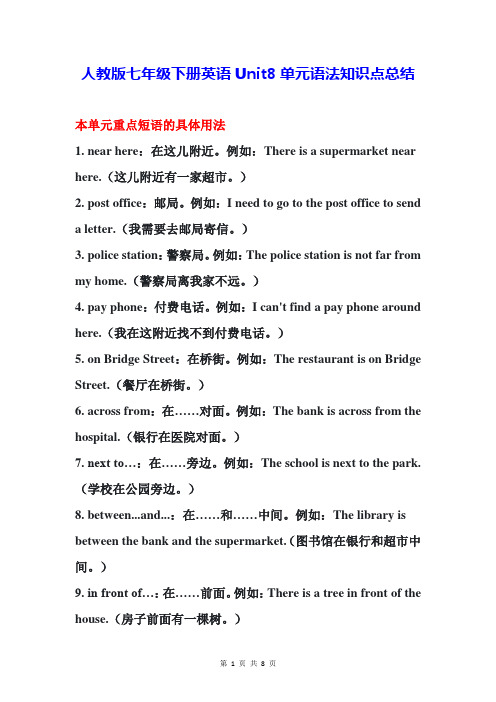
人教版七年级下册英语Unit8单元语法知识点总结本单元重点短语的具体用法1. near here:在这儿附近。
例如:There is a supermarket near here.(这儿附近有一家超市。
)2. post office:邮局。
例如:I need to go to the post office to senda letter.(我需要去邮局寄信。
)3. police station:警察局。
例如:The police station is not far from my home.(警察局离我家不远。
)4. pay phone:付费电话。
例如:I can't find a pay phone around here.(我在这附近找不到付费电话。
)5. on Bridge Street:在桥街。
例如:The restaurant is on Bridge Street.(餐厅在桥街。
)6. across from:在……对面。
例如:The bank is across from the hospital.(银行在医院对面。
)7. next to…:在……旁边。
例如:The school is next to the park.(学校在公园旁边。
)8. between...and...:在……和……中间。
例如:The library is between the bank and the supermarket.(图书馆在银行和超市中间。
)9. in front of…:在……前面。
例如:There is a tree in front of the house.(房子前面有一棵树。
)10. behind…:在……后面。
例如:The car is parked behind the building.(汽车停在建筑物后面。
)11. on Center Street:在中心街。
Unit8祈使句和可数与不可数名词(重点语法)-2023-2024学年八年级英语上册单元模块人教版
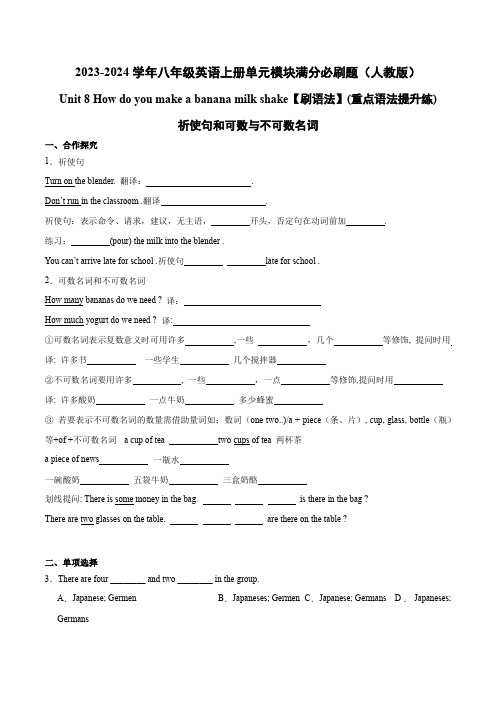
2023-2024学年八年级英语上册单元模块满分必刷题(人教版)Unit 8 How do you make a banana milk shake【刷语法】(重点语法提升练)祈使句和可数与不可数名词一、合作探究1.祈使句Turn on the blender. 翻译: .Don’t run in the classroom .翻译 .祈使句:表示命令、请求,建议,无主语,开头,否定句在动词前加 .练习:(pour) the milk into the blender .You can’t arrive late for school .祈使句late for school .2.可数名词和不可数名词How many bananas do we need ? 译:How much yogurt do we need ?译:①可数名词表示复数意义时可用许多,一些,几个等修饰, 提问时用译: 许多书一些学生几个搅拌器②不可数名词要用许多, 一些,一点等修饰,提问时用译: 许多酸奶一点牛奶多少蜂蜜③若要表示不可数名词的数量需借助量词如:数词(one two..)/a + piece(条、片), cup, glass, bottle(瓶)等+of +不可数名词 a cup of tea two cups of tea 两杯茶a piece of news 一瓶水一碗酸奶五袋牛奶三盒奶酪划线提问: There is some money in the bag. is there in the bag ?There are two glasses on the table. are there on the table ?二、单项选择3.There are four ________ and two ________ in the group.A.Japanese; Germen B.Japaneses; Germen C.Japanese; Germans D.Japaneses;Germans4.The has two .A.boys; watches B.boy; watchC.boy; watches D.boys; watch5.________ kind and helpful to the people around us, and we will make the world a nicer place to live in.A.Be B.Being C.To be D.Been6.The Japanese ________ will not leave China until she finishes her study.A.woman B.women C.man D.men7.There are many ________ in the basket on the table.A.sugar B.yogurt C.tomatoes D.cheese8.________ more exercise and you will be much healthier.A.Taking B.To take C.Took D.Take9.The blender is dirty. Please ________ it after dinner.A.cleans B.clean C.cleaned D.cleaning10.— Mom, the apple is clean now. What should I do next?— ________ the apple into small pieces.A.Cut B.Cutting C.To cut D.To cutting11.—Judy, ________the pieces of that broken glass! Let me sweep them into the rubbish bin first.—OK, I will. Thank you.A.to be careful with B.be careful with C.being careful with D.you are careful with12.—Excuse me, but can you tell me where the nearest bank is?—Just ________ for two more blocks and you’ll see it.A.go B.to go C.going D.goes13.Tom, ________ higher, and you will get the toy you want.A.stands B.to stand C.standing D.stand14.—________ forget your homework.—OK. I will remember ________ it here.A.Don’t; bringing B.Not; to bring C.Don’t; to bring15.—Tom, ________ forget to take your umbrella. It’s going to rain.— OK, I ________.A.doesn’t; will B.don’t; won’t C.don’t; will D.doesn’t; won’t16.My friends often give me lots of ________ on novels.A.advices B.pieces of advices C.pieces of advice D.piece of advises17.—Would you like some ________?—Yes, please. I like drinking it.A.oranges B.beef C.orange18.—I can’t learn English well. What should I do?—Take it easy. Here’s some ________ for you.A.suggestion B.suggestions C.advice D.advices19.—________ water would you like?—I’d like three ________.A.How many; bottles of waters B.How much; bottle of waterC.How many; bottles of water D.How much; bottles of water20.The radio says there will be much ________ next week and maybe we will have ________ off.A.rainier, two days B.rain, two days’C.rainier, two days’D.rain, two days21.We need some ________ and two ________ to make a milk shake.A.bananas, cup of milk B.bananas, cups of milk C.banana, milk22.________ that pair of ________ a little cheaper?A.Is, scissor B.Are, scissor C.Is, scissors D.Are, scissors23.My grandma does very well in making ________ rice with ________.A.mutton; carrot B.muttons; carrot C.mutton; carrots D.muttons; carrots24.We read newspapers and we can get ________.A.many informationsB.much informationC.a few informationD.a little informations25.I have some ________ to tell you.A.piece of news B.pieces of news C.piece of new D.pieces of newses 26.—What’s on the table?—There is ________ and ________.A.an onion;a cup of tea B.an onion;a teaC.a onion;a cup of tea D.a onion;a tea27.—________ honey do we need?—Two ________.A.How many; teaspoons B.How much; teaspoonC.How many; teaspoon D.How much; teaspoons28.—Can I help you?—Yes, please. I’d like to know more ________ about the travel.A.message B.suggestion C.information D.advices 29.He was advised to eat fewer hamburgers and drink ________ cola to keep fit.A.less B.fewer C.much D.more 30.—Are all the students from ________ in your class?―No, there are only three ________ in our class. The others are from other countries.A.Germans; Germany B.Germany; German C.Germany; Germans三、用所给单词的正确形式填空31.(keep)walking with me, Jim.32.Don’t (cover)your face with your hands, please.33.Don’t (be)late for school again, Jack.34.You should not eat too much (sugar). It’s not good for your teeth.35.We bought two new (machine) last month.36.There (be) some water in the bottle. You can have some.37.Why not put some (salt) in the soup, Jim?38.Both his uncle and his aunt are famous (scientist).39.How much (honey)is there in the cup?40.I want to buy some (watermelon) in the market.41.Jack likes to collect different kinds of fallen (leaf) in autumn. 42.Jane has(有)three (watch).43.There are four (library) in the school.44.Doing morning (exercise) is good for us.45.You are good-looking when you wear a pair of . (glass)46.I like eating (fish) for dinner.47.We want three (glass) of water.48.Can you give me some (paper)?49.There is some (chicken) in the bowl.50.May I have three (piece) of (bread)?四、完成句子51.我们一起做牛肉面条吧。
人教版初二(下)英语:unit8语法篇(学生版)

人教版初二(下)英语:unit8语法篇(学生版)4、never用于否定句译为“从不”(放在have和has 的后面)I’ve never been to Beijing.5、ever用于疑问句译为“曾经”(放在have和has 的后面)Have you ever been to Beijing?6. have/has been to; have/has gone to; have/has been in(1) have gone to意为“到某地去”,说话时该人不在现场,一般不用第一人称、第二人称代词作句子的主语。
如:—Where is Jim?———吉姆在哪里?—He has gone to England.———他去英国了。
(尚未回来)Mr Wang isn't here.He has gone to Qingdao.王先生不在这里。
他去青岛了。
(2) have been to意为“曾经去过某地”,现在已不在那里了,后可接次数,如once,twice,three times 等,表示“去过某地几次”,也可和just,never,ever等连用。
如:My father has been to Beijing twice.我父亲去过北京两次。
I have never been to the GREat Wall.我从未去过长城。
(3) have been in表示“在某地呆了多少时间”,常与时间段状语连用。
如:I have been in Shanghai for three years.我到上海已有三年了。
He has been in London for half a month.他来伦敦已有半个月了。
1. Ever since then, she a popular reporter.A. beB. isC. wasD. hasbeen 2. Mr. White has lived inChina more than ten years.A. sinceB. forC. beforeD. after3. The book just came out last month, andwe it yet.A. readB. don'tread C. havereadD.haven'tread4. --- are you staying there?--- For seven days.A. HowB. HowC. HowD. Howlong many much far5. --- Tim his pet dog?--- No, not yet.A. Have;found B. Has;foundC. Does;findD. Did;find基础演练一、单项选择1. --- youever with a group? ---Yes, I have.A. Have;study B. Have;studiedC. Do;studyD. Did;study2. --- I can't find mywatch. you it anywhere, Mum?--- No, never. Look! What's that under your book?A. Have;seen B. Had;seenC. Do;seeD. Did;see3. Miss Lin a lot of work for the poor area since 2019.A. doesB. didC. hasD. will dodone4. --- Mom, may I go out and fly kites?--- you your homework yet?A. Do; finishB. Did; finishC. Have; finishedD. Did; finished5. --- Hi, guys. Where are you heading now?--- Home. We all our money, so we have to walk home now.A. spendB. spentC. havespent D. arespending6. I a cold. I am not feeling well now.A. caughtB. havecaught C. amcatchingD.catches7. --- Why not go to see the dolphin show with us? --- Because I it before.A. seeB. haveseen C. saw D. hadseen8. --- Your English is good.--- Thank you. I it for three years.A. learnB.learned C. havelearnedD. hadlearned9. Have you ever anything you didn't want to say?A. sayB. saidC. sayingD. say10. --- Maria, don't forget to put sugar in my coffee. --- I some already.A. putB. willput C. haveputD. amputting二、翻译(根据中文提示完成句子)11. 你曾经去过新加坡吗?youSingapore?12. 琳达已经做完了作业。
人教版八年级上册英语Unit 8 知识点语法归纳总结

人教版八年级上册英语Unit 8 知识点语法归纳总结一、过去进行时(Past Continuous Tense)过去进行时用于表示过去某一时刻或某段时间正在进行的动作或状态。
1. 构成肯定句:主语 + was/were + 动词的ing形式否定句:主语 + was/were not + 动词的ing形式一般疑问句:Was/Were + 主语 + 动词的ing形式?肯定回答:Yes, 主语 + was/were.否定回答:No, 主语 + wasn't/weren't.2. 使用场景过去进行时常用于以下场景:- 表示过去某一时刻正在进行的动作- She was cooking dinner when I arrived. (我到达的时候,她正在做晚饭。
)- 表示过去某一段时间内持续进行的动作- They were playing basketball all afternoon. (他们整个下午都在打篮球。
)- 表示过去两个同时进行的动作- While he was studying, I was watching TV. (他在研究的时候,我正在看电视。
)二、过去完成时(Past Perfect Tense)过去完成时用于表示在过去某一时间或动作之前已经发生的动作或状态。
1. 构成肯定句:主语 + had + 过去分词否定句:主语 + hadn't + 过去分词一般疑问句:Had + 主语 + 过去分词?肯定回答:Yes, 主语 + had.否定回答:No, 主语 + hadn't.2. 使用场景过去完成时常用于以下场景:- 表示在过去某一时间或动作之前已经发生的动作- They had already left when I arrived. (当我到达时,他们已经离开了。
)- 表示过去某一时间之前已经完成的动作- She had finished her homework before dinner. (她在晚饭之前已经完成了作业。
人教版七年级下册UNIT 8 语法:There be句型

There be句型考点
6.There be 句型用的其他动词: There be 句型中有时不用动词be ,而用come , live ,stand , lie,seem to be , happen to be . There used to be a cinema here before the war. 战前这里有一个电影院。 There happened to be a man walking by. 恰好有一个人从旁经过。 There seems/appears something the matter with her. 她好像是出了什么事似的。 There existed different opinions on this issue. 对这个问题曾有不同看法。 There remained just twenty-eight pounds. 只剩28英镑了。
There be句型考点
7.There be后接表示物的主语时,后面常接不定式作定语,不定式常用主动形式 表示被动意义。 There is a lot of work to do. 有许多工作要做(工作被做)
8.There be后接表示人或动物的主语时,后面长接V-ing形式作定语。 There are some children playing downstairs. 几个孩子在楼下玩。
There be句型和have/has的区别
There be表示某地有某人/物,强调客观存在 There is an apple on the table. There are two men in the office.
have/has表示某人拥有某物, 强调主观拥有 I have an apple. He has two sons.
人教版九年级英语Unit8It-must-belong-to-Carla语法经典总结

Unit8It must belong to CarlaSection A (1a-2d)*belong to“属于”It belongs to me!=It is mine.语法重点一1. It must belong to Carla. 它一定是属于卡拉的。
belong to意为“属于,为……所拥有”。
belong to没有被动语态,也不能用于进行时态。
belong to 后可接名词或代词宾语,不能接物主代词,也不能接名词所有格。
must be +sb.’s 意为“一定是某人的”must belong to sb.意为“一定属于某人”The book must be Mary’s.=The book must belong to Mary.(3A-4C)1. However, these days, something unusual is happening in our town.然而,这些天在我们小镇发生一些不平常的事情。
happen为不及物动词,意为“发生;碰巧”,指事情的发生带有一定的偶然性或不能预料。
如:The accident happened 3 days ago.2 happen有关的常用搭配:sth. happen to sb.某人发生某事sb. happen to do sth.某人碰巧做某事如:What happened to you last night?I happened to meet one of my goodfriends in the street.2.第三课时B (1A-1D ) 如:The man is running after his son because he doesn’t want to do his homework 类似的词组还有:read after跟着读如:Our teacher often asks us to read after him. 上句常也用单词follow 来表达。
北师大版初三英语第16讲:unit 8 语法篇(教师版)
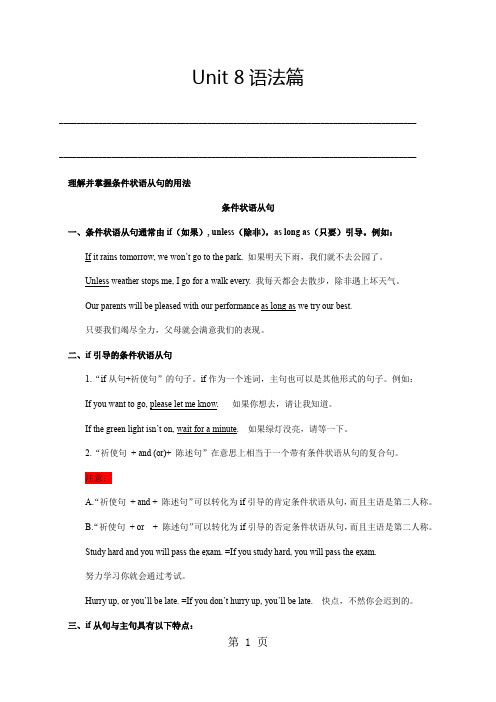
Unit 8语法篇____________________________________________________________________________________________________________________________________________________________________理解并掌握条件状语从句的用法条件状语从句一、条件状语从句通常由if(如果), unless(除非),as long as(只要)引导。
例如:If it rains tomorrow, we won’t go to the park. 如果明天下雨,我们就不去公园了。
Unless weather stops me, I go for a walk every. 我每天都会去散步,除非遇上坏天气。
Our parents will be pleased with our performance as long as we try our best.只要我们竭尽全力,父母就会满意我们的表现。
二、if引导的条件状语从句1.“if从句+祈使句”的句子。
if作为一个连词,主句也可以是其他形式的句子。
例如:If you want to go, please let me know. 如果你想去,请让我知道。
If the green light isn’t on, wait for a minute. 如果绿灯没亮,请等一下。
2.“祈使句+ and (or)+ 陈述句”在意思上相当于一个带有条件状语从句的复合句。
注意:A.“祈使句+ and + 陈述句”可以转化为if引导的肯定条件状语从句,而且主语是第二人称。
B.“祈使句+ or + 陈述句”可以转化为if引导的否定条件状语从句,而且主语是第二人称。
Study hard and you will pass the exam. =If you study hard, you will pass the exam.努力学习你就会通过考试。
人教版九年级全一册英语Unit8单元语法知识点总结
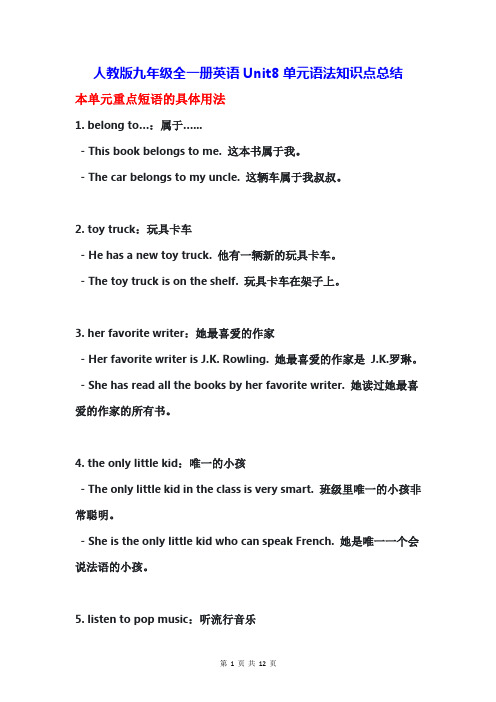
人教版九年级全一册英语Unit8单元语法知识点总结本单元重点短语的具体用法1. belong to…:属于…...- This book belongs to me. 这本书属于我。
- The car belongs to my uncle. 这辆车属于我叔叔。
2. toy truck:玩具卡车- He has a new toy truck. 他有一辆新的玩具卡车。
- The toy truck is on the shelf. 玩具卡车在架子上。
3. her favorite writer:她最喜爱的作家- Her favorite writer is J.K. Rowling. 她最喜爱的作家是J.K.罗琳。
- She has read all the books by her favorite writer. 她读过她最喜爱的作家的所有书。
4. the only little kid:唯一的小孩- The only little kid in the class is very smart. 班级里唯一的小孩非常聪明。
- She is the only little kid who can speak French. 她是唯一一个会说法语的小孩。
5. listen to pop music:听流行音乐- I like to listen to pop music. 我喜欢听流行音乐。
- They are listening to pop music in the car. 他们在车里听流行音乐。
6. hair band:发带- She wears a beautiful hair band. 她戴着一个漂亮的发带。
- The hair band matches her dress. 发带和她的裙子很搭配。
7. attend a concert:参加音乐会- We attended a great concert last night. 昨晚我们参加了一场很棒的音乐会。
九年级英语上册unit8知识要点

九年级英语上册Unit8 It must belong to Carla.一、语法:情态动词表示推测的用法Ⅰ、情态动词的基本用法:(一)、情态动词的语法特征:①情态动词有具体的词义。
②情态动词没有人称和数的变化。
③情态动词后必须跟动词原形,两者一起构成谓语动词。
④一般疑问句提前边,否定句在后直接加not.(二)、情态动词的用法:1、can / can not用法1)表示能力(会)Mary can speak English, but she can not speak French. 玛丽会讲英语,但不会讲法语。
Can you lift this heavy box? 你能搬起这个重箱子吗?Can you skate? 你会滑冰吗?2)表示允许(可以)Can I use your dictionary? 我能用一下你的词典吗?-- Can I go home now?-- Yes, you can. / No, you can’t.2、could的用法1)是can 的过去式;表示过去的能力;He could ride a bike at the age of five. 在他五岁时就能骑自行车。
2)用于婉转语气,多用于问句。
“能,可以”Could you please clean the room?---- Could I come to see you tomorrow? ---- Yes, you can. ( No, you can’t. )此处could 不是过去式,只是语气更委婉,答语中不能用could和couldn’t,要用can 和can’t。
3、may、might的用法1)表示请求和允许(可以), 比can 正式.May I come in?He may come if he likes.may的一般疑问句,其否定回答用can’t 或mustn’t。
--May I go home now? --Yes, you may. / Sure. / Yes, please.-- No, you can’t./ mustn’t.2)might①是may 的过去式。
Unit8单元语法 鲁教版九年级英语全一册

Unit 8单元语法——现在进行时&现在完成时&被动语态I.现在进行时1.现在进行时的构成:助动词be+动词.ing形式2.现在进行时的用法:表示现在正在进行或发生的动作,也表示现阶段或当前一段时间内正在进行的动作、常与now, look, listen, these days 等词语连用。
例:They are playing basketball now. 现在他们正在打篮球。
Listen! She is singing an English song 听!她正在唱一首英语歌。
Wc are making model planes these days.这些天我们在做飞机模型。
Look! The children are fling kites in the park.看!孩子们正在公园里放风筝。
3.现在进行时的句式:/肯定句式:主语+be (am/is/are)+动词・ing形式+其他.例:She is singing in the room.她正在房间里唱歌。
/ 否定句式:主语+be(am/is/are)+iiot+动词・ing形式+其他.例:She isn^t singing in the room. 她没有在房间里唱歌。
, 一般疑问句:Be(am/is/are)+主语+动词・ing形式+其他?例:Is she singing in the room? 她正在房间里唱歌吗?/ 特殊疑问句:疑问词+be(am/is/are)+主语+动词・ing形式+其他?例:What is she doing in the room? 她正在房间里做什么?IV .语法专练i.单项选择1.—Will you go and see the movie Net Mother with me? -Thank you. But I __________ already.A.sawB.have seenC.see2.--When will Diana arrive?—Oh, she _______ . She is in the meeting room now.A.arrivesB.is arrivingC.has arrived3.-I'd like to introduce my best friend to you, Peter.—Thank you, Lucy. But we __________ already.A.meetB.metC.will meet4.-Are Betty and Lingling stil living in Beijing?—No, they _________ to Qingdao.A.will moveB.are movedC.have just moved5.—Have you finished your homework yet?—Yes. I ________ it twenty minutes ago.A.have finishedB.finishedC.will finish6.So far, Li Tong ________ about 100 English books.A.readB.readsC.have read7.--Have you packed the books _________ ?—Yes, I have _________ packed them.A.yet; yetB.yet; alreadyC.already; already8.--Why not see the dolphin show with us? —Because I D.will seeD. arrivedD.have metD.moveD.had finished D.has read□.already; yet_______ it before.A.seeB.have seenC.sawD.had seen9.--Have you ________ travelled by train? —Yes, 1 have.A.neverB.everC.justD.yet10.Lucy\ mother _________ stamps for two years.A.collectedB.is collectingC.has collectedD.will collect11 .The environment is improving because many trees ______ every year.A.plantB.plantedC.are plantedD.are planting12.Nowadays, because of the Readers(《朗读者》)by CCTV, many book fans ____ reading in public place.A.will seeB.were seenC.are seenD.have seen13.Chinese ______ by more and more people around the world.A.is spokenB.speakC.speakingD.is speaking14.We Chinese _______ the touching documentary Amazing China.courageB.encouragesC.are encouragedD.are encouraging15.The latest mobile phone _____ in China.A.will makeB.has madeC.is makingD.is made16.______________________________ -People, especially the young, by their friends.—That's true. Friends play an important part in everyone's life.A.easily influencesB.is easily influencedC.are easily influencedD.influenced easily17.-Your classroom looks so clean and tidy. —Yes, it _____ every day. A.cleans B.is cleaned C.cleaned D.was cleaned18.__________________________________ T he Chinese traditional poems singers to spread by popular.20. -Do you know the famous artist in red?to the art festival in our city every year. 21. -Do you know anything about C919?-Of course. It's a kind of plane which23. --Let's go to play soccer, Peter.—I'm afraid not. Til need one more hour before my homework24. -Can you go to the movies with me tonight?--I have to ask my mum. If I25. -Your hometown is beautiful, and the air is really fresh.-Yes. Many trees and flowers26. ________________ Too much time on computer games by most teenagers every day. And theirparents are worried about their health and study.A.is singingB.are singingC.is sungD.are sung 19.Pu'er teain some western areas of Yunnan. A.plantsB.was plantedC.is plantingD.is planted —Sure. HeA.invitesB. invitedC.is invitedD.was invitedChina. A.is made of B.is made inC. is made fromD.is made up of 22. Thc latest mobile phone in China.A.will makeB.has madeC.is makingD.is made A.has finishedB.finishedC.will be finishedD.is finished,I will go with you. A.allowB.allowedC.am allowedD.was allowed around here every year. A.plantB.are plantedC.was plantedD.will plant A.spends B.is spent C.has spent □.spending27.-Tom! I looked for you everywhere at the party last night.—Oh, I _____ to the party.A.am invitedB.was invitedC.am not invitedD.wasn't invited28.These model cars _______ China in 2013.A.are madeB.were madeC.makeD.made29.Annie ____ to the parly. She had a wonderful time with us.A.invitesB.is invitedC.was invitedD.has invitedMo Yan^ latest novel, please!—Sorry, it ______ j ust now. But it will come out again soon.A.sold outB.is sold outC.has sold outD.was sold out31.On October, 16th, 2021, Shenzhou-13 cairying three astronauts _________ into space from the space center in Jiuquan. All the Chinese people are proud of its successful launch.A.sent upB.are sent upC.was sent upD.send up32.Do you know when the fist train in China?A.was producedB.is producedC.produced □.produces33.—Have you heard about that car accident near the school?—Yes, luckily no oneA.hurtedB.was hurtC.has hurtD.were hurt34.Teenagers allowed to drive.A.should not beB.should be notC.not should beD.should to be not35.The dictionary may for three weeks.A.keepB.be keptC. borrowD.be borrowed36.-It's difficult to get to the other side of the rive.—I think a bridge ______ over the river.A.should be builtB.should buildC.will buildD.has built ii .根据要求完成句子I.Mr. Green has travelled to several places in China.(改为否定句。
人教版初二上册英语第八单元unit8语法篇

Unit 8 语法篇名词:1、英语名词可分专有名词和普通名词两大类:(1)、专有名词是个别的人、地、物、团体、机构等的专用名称。
专有名词中实词的第一个字母要大写。
如: Beijing, Tom, the People ’ s Republic of China( 中华人民共和国 )专有名词如果是含有普通名词的短语, 则必须使用定冠词the 。
如: the Great Wall( 长城 )姓氏名如果采用复数形式 , 则表示该姓氏一家人(复数含义 ), 如: the Greens( 格林一家人 ) 。
( 2)、普通名词是许多人或事物的共有名称。
如:pupil, family, man, foot. 普通名词又分为可数名词和不可数名词。
▲可数名词是可以用简单的数词进行计数的名词, 如: box, child, orange ;▲不可数名词是不可以用简单的数词进行计数的名词。
如:water, news, oil, population,information .2、英语可数名词的单复数:英语可数名词有单数和复数两种形式。
1、名词由单数变复数的基本方法如下:①在单数名词词尾加s。
如: map → maps,boy → boys,horse → horses, table →tables.② s,o,x ,sh,ch 结尾的词加es. 如: class → classes, box → boxes, hero → heroes, dish →dishes,bench→ benches.[ 注 ] :少数以 o 结尾的词 , 变复数时只加s。
如: photo → photos, piano→ pianos. 有生命加 -es, 没生命加 -s③以辅音字母加y 结尾的名词 , 变 y 为 i, 再加 es。
如: family → families, city → cities, party→ parties.④以 f 或 fe 结尾的名词 , 变 f 或 fe 为 v, 再加 es。
- 1、下载文档前请自行甄别文档内容的完整性,平台不提供额外的编辑、内容补充、找答案等附加服务。
- 2、"仅部分预览"的文档,不可在线预览部分如存在完整性等问题,可反馈申请退款(可完整预览的文档不适用该条件!)。
- 3、如文档侵犯您的权益,请联系客服反馈,我们会尽快为您处理(人工客服工作时间:9:00-18:30)。
U nit 8 时间状语从句以及used to/did not used to
语法观察室:
一、时间状语从句:
1. When I was at primary school, I took swimming lessons once a week.
I took swimming lessons once a week when I was at primary school.
2. She always sings when she is on the way home.
When she is on the way home, she always sings.
3. I will tell him everything when he comes back.
4. I am watching TV while my mum is cooking.
5. I will come to see you before I go abroad.
6. After I got home, I helped my mother do some housework.
7. I will give you a call as soon as he comes back.
8. He didn’t go to bed until his mother came back.
二、used to/did not used to
1. He used to live in Hangzhou, and now he move to Guangzhou.
2. My mum didn’t used to dance in the park, but now she goes there once a week.
3. Did you use to go to the park at the weekend?
4. We used the knife to cut the apples.
语法放大镜:
1. when从句可放在主句_______或________ , 当位于主句之前时,句中要用
________ 隔开。
2. 时间状语从句中,主句与从句的时态要________。
注意:如果主句是一般将来时,从句要用用_____________表示将来的动作或状态。
另外,连接时间状语从句的连接词还有:__________, __________, __________, _______________, ______________.
3. 从上面的例句中,我们知道used to 表示_________________,现在不做了,表达的是__________时态,后接动词的___________。
而didn’t use to 表示________________, 现在做了。
它的疑问句形式是:Did + 主语+ use to + 动词原形。
4. use something to do 意思是_________________。
注意与used to do 的区别。
语法最前线:
★一. Use the correct forms to fill in the blanks.
1. She always ______( work) hard when she was at school.
2. He likes to listen to the music when he _____ (do) his homework.
3. When I ____ (be) at the age of five, I ______ (like) playing toy cars.
4. She will come to see you as soon as she ________ (arrive)
5. The party didn’t start until Miss Chen ________ (be) there.
★二. Choose the correct answer:
( ) 1. Lucy ____ me with my English, but she doesn’t now.
A. used to helping
B. is used to help
C. used to help
D. uses to help
( ) 2. They will go to the park ____ the weather is fine.
A. after
B. when
C. before
D. what
( ) 3. What do you want to be when you ____ up?
A. will grow
B. growing
C. grew
D. grow
( ) 4. When we ____ on holidays, we ____ a lot of beautiful photos.
A. are; took
B. were; took
C. were; take
D. will be; take
( ) 5. —____ Lucy ____ to eat a lot of food?
—Yes, she did. But now she eats little to keep fit.
A. Did; use
B. Does; use
C. Did; used
D. Do; use
( ) 6. His father _________ write by hand, but now he ________ computer to write.
A. used to, used
B. is used to, used to
C. used to, uses
D. is used for, used to
★三. 句型转换。
1. I bought some red wine. I was in Italy at that time.(改为同义句)
____ I was in Italy, I ______ some red wine.
2. She often did yoga after work in the past, but she doesn’t do it now.(改为同义句)
She ____ ____ do yoga after work in the past.
3. My aunt used to make a phone call to me every weekend. (改为否定句)
My aunt ____ ____ ____ make a phone call to me every weekend.
4. Tom used to play basketball with his classmates.(改为一般疑问句)
____ Tom ____ ____ ____ basketball with his classmates?
Keys for Unit 8
语法放大镜:
1. 前面,后面,逗号
2. 一致,一般现在时,while, before, after, as soon as, until
3. 过去常常做某事,过去,原形,过去常常不做某事
4. 用……做……
语法最前线:
一.1. worked 2. does 3. was, liked 4. arrived 5. was
二.C B D B A C
三.1. When ,bought 2. used to 3. didn’t use to 4. Did, use to play。
